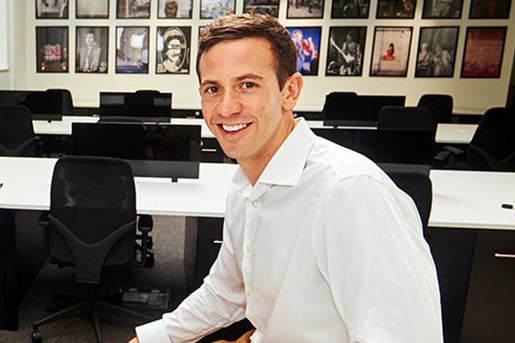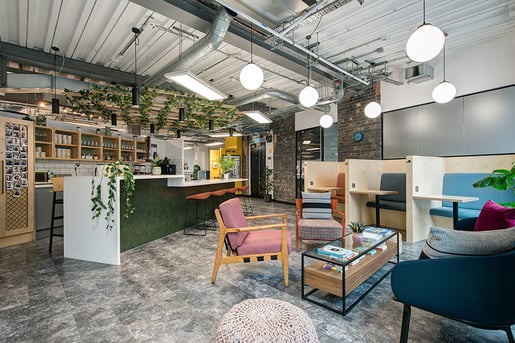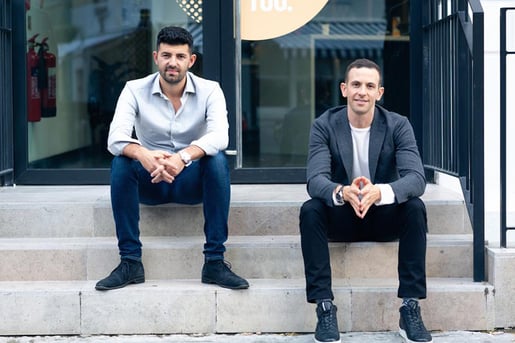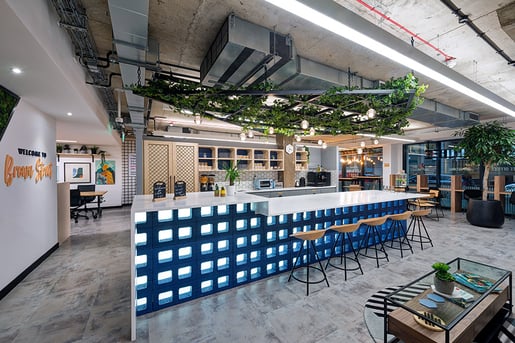|
In light of the coronavirus pandemic affecting countries worldwide, this Creatif Conversation is the first to be conducted via video call, rather than face to face. It was particularly timely to be speaking to Elliot Gold, Co-Founder of Work.Life, as he owns coworking spaces across London, Reading and Manchester. We spoke to Elliot to discuss how now, more than ever, is the time to evaluate what a ‘workspace’ really means and why flexibility is key when it comes to ensuring employee happiness. Creatif: At the time of speaking, we are two weeks into the suggested ‘home working’ period, as mandated by the government. How are you and your teams’ work lives being impacted by this? Elliot Gold: It’s an interesting time isn’t it? It certainly seems to be a mass experiment for home working. At a high level, hopefully companies will realise that people don’t need to be in the office to get work done and that workers will have learnt some skills in what it takes to work from home. Offices were traditionally tools for managers to use as a way of spying on workers, to make sure they were working. Take away this tool and some managers are left wondering whether their staff are working, which is ridiculous! I hope that this is the start of moving towards a more trusting culture. Teams will have been thinking about flexible working for a long time – utilising coworking spaces, promoting activity-based working, and encouraging working from home – but many businesses are way behind the curve. This, what is happening right now, is a forced learning curve. It won’t be easy. It’s a huge shift in the way we all work, but it will have been far easier for those who had already embraced flexible working. For example, a friend of mine has transformed his whole operational structure to fit around home working, so all 80 of his staff are already experienced and thriving from working from home. In terms of my team, I work with around 60 people who have been practicing what we preach since Work.Life’s inception - we didn’t have an office for the first three and a half years of operating - so thankfully we’re managing quite well, but of course it still has its challenges.
Creatif: You mentioned that you didn’t have an office for the first few years. How did you overcome the challenges you faced during that time? EG: I found it helped having clear targets and using data in a much more effective way. There was still structure, it was just different to one with four walls. It’s also important to acknowledge that the office also provides social structures which is why - up until a few weeks ago! - business models like ours were so popular. Having worked in the traditional corporate world for eight years or so, I remember what it felt like to transition from 9-5 to working on my own. And truthfully, there was a three-month period where it felt like the world got turned upside down. At first, I was super productive, super engaged and super flexible. Then, one day, you find yourself sat in your underwear at midday questioning what you’re doing with your life. You cannot underestimate the shock of moving from a familiar work structure to working on your own. You still feel like you should be reporting to someone, you still feel guilty if you don’t work in the habitual linear pattern. We’ve been trained, conditioned even, that that is what work looks like. That’s where coworking comes in to play, which my colleagues are now all living breathing examples of how it can work. Whilst we provide a service level, there is also a social level, connecting various small businesses throughout the week. You get to talk to someone about your weekend, over a coffee, about projects you’re working on. It begins to feel like being at work. Creatif: If we look back at your past endeavours, you’ve clearly got a strong entrepreneurial spirit. Would you say you’re a natural risk-taker? EG: No, I wouldn’t actually. I take lots of risks, but I ponder over them a lot. I spent a few years working in the public sector on a government scheme we’d set up from scratch to help small businesses in their first years of business. They gave us a pool of funds and over 2 years we did over 100,000 loans. We saw a huge number of business plans come through, which meant I had access to the data of what happened to these businesses a year or two after trading. All these people who thought they had the next Google-big idea? In reality 9 out of 10 companies would cease trading. The impact this had on me was phenomenal. I shifted from lots of risk, to a tried and tested model. Coworking is a form of an industry that’s been there for a long period of time, and it’s an elegant business model. As a business, you spend the first part of your time figuring out what the hell you’re doing and figuring out whether there’s a need for it.
For me, I wanted a tried and tested business model, where the goal was not about proving people needed workspace, but actually about how do you grow and scale a successful business. |
Creatif: In your opinion, what’s an often overlooked yet crucial factor when creating a coworking space? EG: Variety of space. You’re catering for as many different people as possible, so the key is to provide all of those set ups. We did an exercise in our Soho space where we looked at all of the different types of spaces spread across 11,000 feet, and we realised we had 17 distinct types of working areas within one space. Soft seating, office seating, hot desking, standing desks, relaxing areas, breakout spaces – you name it, we’ve got it. People need space to move about in. You need to cater for a mixture of people, because then you’re able to cater for many.
Creatif: What was it about your Co-Founder David Kosky that made you feel like he’d be a good person to take a risk with? EG: It was serendipitous. We’d left our careers at the same time and whilst we were doing due diligence on a few projects, we found we worked really well together. It wasn’t actually our intention to go into business together. Do you know the advice I’d give to anyone looking for a Co-Founder? Find someone who is diametrically opposed to you in every way. David and I bicker constantly. We disagree on almost everything. And, in many ways that’s incredibly useful – frustrating, yes – but the benefit you get is looking at things through two different lenses. Creatif: In 2019 you won the ‘People’s Champion’ Hubble Award, with the judges saying that “Work.Life fully deserves this award because of the way that they use ground floor spaces to activate the ground plane”. What exactly does this mean? EG: Our property model means we only take the ground floor, rather than the whole building. The benefit for the landlord is it increases lettings on other floors, and we remain actively engaged with the local community on our doorstep, as opposed to being stuck on the ninth floor where you could be in any building across the country. As well as being an interesting property strategy, it’s also become a great marketing tactic, with people wondering ‘what is this place? It feels like a mix between a coffee space and an office?’ so it visually piques your interest when you walk past. Creatif: A core part of the ethos behind Work.Life is just how people-centric it strives to be. A new introduction is the Work Happy Score. Can you explain more about this and what factors are taken into account? EG: This is a really interesting one. The main reason we started Work.Life is because we believe that everyone should enjoy a happy work life, regardless of what they do. I know that can sound a bit fluffy, but most of us have experienced working in truly miserable places where you start the day with a grimace, put the tie on, do the commute, drain yourself in the office, then at the end of the day take the tie off and go back to your ‘normal’ life. We’re the antithesis to that. Our environments make people feel welcome, relaxed, recharged and most importantly happy to be there. There are so many statistics confirming that the UK workforce is disengaged with what they do on a day to day basis, so surely making people happier is a great place to start. Obviously, there are other factors (you join a company, but you leave because of the manager, so human factors will always play a large part) but the workspace does have a very important role in your overall workplace happiness. So, with the Work Happy Score, we decided to dissect it. What can a workspace contribute? That’s what we’re currently exploring and measuring. We’re doing stuff operationally to support small businesses, but we want to show them that by being part of our coworking communities, you can benefit from so much more. Daily fresh fruit, running clubs, weekly yoga classes: these kinds of perks help people to enjoy exercise and nutrition together, so wellness becomes a shared communal goal. You don’t get that when you’re working from home alone. There are essential office basics; comfortable seating, ambient acoustics, easy lighting, appetising drinks and fun activities, but it’s about making it more than that. A truly immersive, people-centric experience, which can be measured and used as evidence to encourage people to shift away from conventional offices. In the age of talent retention, if you can demonstrate that moving to a coworking space has resulted in happy, healthy, and productive employees, then that’s a pretty great outcome.
|



